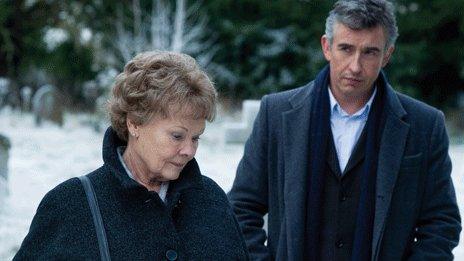Frears tells tragic Philomena story for humour
- Published

Dame Judi Dench plays a heartbroken mother, while Steve Coogan is a journalist
Stephen Frears's film Philomena, co-written by, and starring Steve Coogan, won the best screenplay award at this year's Venice Film Festival.
A festival favourite, one critic called it "the best reaction to a film since the first screening of The King's Speech".
The film adapts the real-life story uncovered by former BBC News journalist Martin Sixsmith, which he recounts in a book, The Lost Child of Philomena Lee.
Dame Judi Dench plays the part of Philomena Lee, who as an unmarried mother in Ireland in the 1950s, was forced to give up her son Anthony to a local convent, who sold him for adoption. After keeping quiet for nearly 50 years, Mrs Lee asked Sixsmith to uncover the fate of Mrs Lee's son.
It was, according to Dame Judi, "a harrowing story, but my emotion doesn't come into it. You have to understand the tale and what happened to Philomena. I hope that we tell her story and that we don't sell her short. That is my biggest fear.
"The real Philomena is an incredibly funny person. She is bright and interesting and has a wonderful sense of humour. That's why the film has to be so comical in places too, it reflects her and her joy in her life, which she has kept despite everything that has happened to her."
Withheld information
Mrs Lee is now nearly 80 years old and living in the south of England, but discovered with the help of Sixsmith that Anthony Lee had been adopted by an American couple, and re-named Michael Hess.

Frears scored commercial succcess with The Queen
He grew up to be a rising star in Ronald Regan's Republican party of the 1980s, but remained desperate to trace his birth mother.
Both he and Philomena made inquiries about each other at the convent where he was born in 1952, Roscrea in County Tipperary, but its nuns withheld information that would have reunited the pair.
Stephen Frears states that his spiritual beliefs "are more in line with cynical journalists than people of simple faith like Philomena", but says that he wants "the new Pope Francis to watch this film. I really want him to see it. He seems like a good bloke, and he's making changes within the church. I think he'd enjoy it."
The director adds that he doesn't think the movie "will change anything within the Catholic church, but I do think that people's response to the film might have an effect.
"You can feel it, you can tell there is a change in the air. Something is touching the church, and you can see it slowly beginning to respond. The Irish government has publicly acknowledged that these places existed, and that Philomena was not the only one who lost her child to the church's policy on unmarried mothers. The government has apologised, but it's a slow process. Perhaps this film will move it another fraction of an inch again."
Coogan adds that "it's not our intention to hammer the Catholic church of 50 years ago, times were different. But two wrongs took place here - one that Philomena was forced to give up her child, and secondly that they refused to reunite the pair. I hope that though we criticise the institution, we dignify people of faith."
Dame Judi adds that she was "breathtaken" by the real Philomena Lee's Christian faith, especially as she publicly forgave the nuns of Roscrea for refusing to reunite her with her son.
"She is still a practising Catholic," the actress points out. "I am a Quaker myself, but I don't know that I would have it in me to forgive as she forgave them. And the wonderful thing is, that by refusing to have hatred and resentment in her heart, by that act she made her faith even stronger than it was before. She is remarkable."
'Head turned'
Critics have been unanimous in their praise of the film, with the Telegraph calling it "a crowd-delighter", and the Hollywood Reporter adding that it is "touching, witty and absorbing". It also points out, however, that the subject matter might be too similar to a past Venice Golden Lion winner, Peter Mullan's The Magdalene Sisters.
Commercial success though, also seems assured, after the producer who bought The King's Speech, Harvey Weinstein, also bought the rights to Philomena after a short screening of footage at Cannes.
Frears, who had huge critical success with Helen Mirren in 2006's The Queen, declares that he's "delighted".
"Of course I am, although I'm far too busy to be suffering on red carpets again and having my head turned.
"I'd like to speak to Philomena herself though and see what she thinks. And just warn her, because I dread to think how much publicity she is going to receive now off the back of this. She has no idea what is about to hit her."
Philomena is released in the UK on 1 November.
- Published15 May 2013